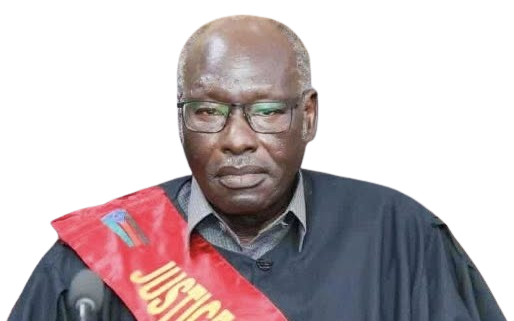A special court in South Sudan adjourned proceedings until Wednesday morning after a second session on Tuesday focused on legal arguments challenging the court’s authority to try First Vice President Riek Machar and seven co-defendants on charges including treason and crimes against humanity.
The hearing, presided over by Justice James Alala Deng, centered on a defense motion questioning the court’s jurisdiction. Defense lawyers argued that the court lacks the legal authority to try Machar, and that his immunity as first vice president must be formally lifted before any trial can proceed.
All eight defendants were present in the courtroom at Freedom Hall. They were identified as Puot Kang Chuol, 40; Mam Pal Dhuor, 37; Gatwech Lam Puoch, 66; Lt. Gen. Gabriel Duop Lam, 53; Dr. Riek Machar Teny, 73; Camilo Gatmai Kel, 47; Mading Yak Riek, 45; and Dominic Gatgok Riek, 27.
The case stems from deadly clashes in the town of Nasir earlier this year, which the government alleges involved Machar’s Sudan People’s Liberation Movement/Army-in-Opposition (SPLM/A-IO).
Machar’s lead defense lawyer, Dr. Geri Raimondo Legge, reiterated his objection to the special court’s jurisdiction, arguing that the special court must first establish its authority before moving to the substance of the charges.
“Jurisdiction, my lord, is the power of the court to hear and determine the subject matter in controversy between the parties. In other words, jurisdiction is the authority of courts of law to exercise judicial powers,” Raimondo told the three-judge panel. “The special court must have jurisdiction before it can proceed to exercise its authority in this case.”
Raimondo, a former Court of Appeal justice and current law professor, further argued that the incident in Nasir constituted a ceasefire violation between parties to the country’s peace agreement and should be handled by the Ceasefire and Transitional Security Arrangements Monitoring and Verification Mechanism (CTSAMVM), a body established under the 2018 revitalized peace deal.
“The incident in Nasir is a case of ceasefire violations—clashes between the two parties. As such, the revitalized agreement provides a mechanism for investigating this matter through CTSAMVM,” he said.
He said the investigation could also involve meetings of the IGAD Council of Ministers to discuss the events in Nasir, adding that the case does not fall under the jurisdiction of the special court.
In response, the prosecution, led by Deng Achuil Adija, submitted a written rebuttal addressing three key defense objections: the competence of the special court, its jurisdiction as a “hybrid court,” and Machar’s immunity as First Vice President.
“We submitted our response to the defense team in written form,” Adija told the court. “The response addresses the competence of the special court, the jurisdiction of the hybrid court, and the immunity of the First Vice President.”
A procedural dispute also arose when the prosecution attempted to submit a separate document addressing a defense objection to the presence of private lawyers assisting the public prosecution team. Justice Alala ruled that all responses should have been included in a single, comprehensive submission.
After hearing both sides, Justice Alala adjourned the session to allow the court to deliberate on the defense’s jurisdictional challenge.
“We are going to put up the session so that we are able to look into the application being raised by the defense,” Alala said before adjourning until Wednesday morning.
Separately, Justice Alala also directed that access to the proceedings be opened beyond the state-owned South Sudan Broadcasting Corporation (SSBC). He emphasized that independent media must be allowed to cover court proceedings, stating, “They know the law, they know how to report, and will be responsible for what they are reporting. No way to close or to block any media house that is coming, or any other interested citizen. So this must be clear.”
The special court—comprising Justices Stephen Simon, Isaac Pur Majak, and presiding judge Alala—is a key component of the government’s case against senior opposition figures.
The charges against the eight accused include treason, murder, crime against humanity, conspiracy, financing terrorism, destruction of public property, and crimes against humanity.
Wednesday’s ruling on jurisdiction of the special court will determine whether the trial proceeds to address the substantive charges or is halted on procedural grounds.




